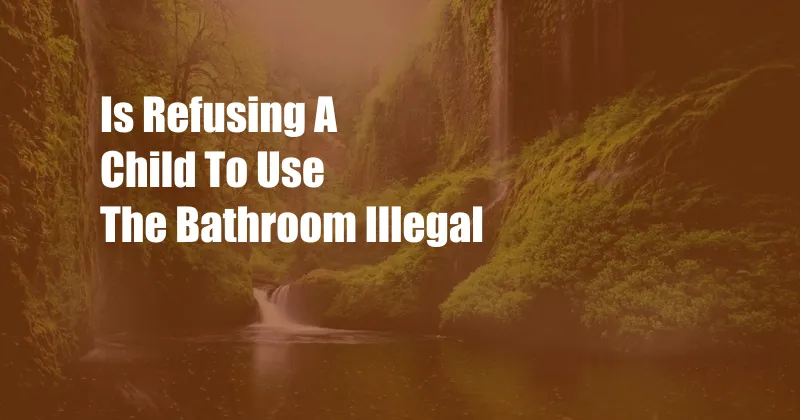
Is Refusing a Child to Use the Bathroom Illegal?
In the modern world, where children’s rights are rightfully prioritized, one might assume that denying a child access to a bathroom is undoubtedly illegal. After all, it is an essential human need that should not be withheld from anyone, especially a vulnerable child. However, the legal landscape surrounding this issue is not always clear-cut, and it can vary depending on specific circumstances and jurisdictions.
This article delves into the murky legal waters surrounding the refusal of bathroom access to children, exploring the ethical, legal, and practical implications of such a practice. By shedding light on the complex nuances of this issue, we aim to foster informed discussions and responsible decision-making in the best interests of children’s well-being.
Understanding the Legal Framework
In many countries, refusing a child to use the bathroom is not explicitly prohibited by law. However, such refusal may constitute a violation of other legal provisions or ethical guidelines that protect children’s rights.
The United Nations Convention on the Rights of the Child (UNCRC), ratified by most countries worldwide, recognizes the right of every child to basic necessities, including access to sanitation. Additionally, many national laws and regulations incorporate similar principles, prohibiting the denial of essential services to children.
Ethical and Practical Considerations
Beyond legal implications, refusing a child to use the bathroom raises significant ethical and practical concerns. Denying a child’s basic needs can have severe consequences for their physical and emotional well-being. Holding urine or feces for extended periods can lead to medical issues such as urinary tract infections, constipation, and discomfort.
Moreover, prohibiting a child from using the bathroom can create a hostile and demeaning environment, undermining their dignity and trust. It can also disrupt their daily routines and make it difficult for them to participate in activities outside the home.
Exceptions and Special Circumstances
There may be rare exceptions where refusing a child to use the bathroom is justified. For instance, if a child has a contagious illness and using a public bathroom poses a health risk to others, it may be reasonable to temporarily restrict their access to the bathroom.
However, these exceptions should be carefully considered and implemented with the child’s best interests in mind. Alternative arrangements, such as providing a designated bathroom for sick children or arranging for a parent or guardian to accompany the child to the bathroom, should be explored.
Tips and Expert Advice
To ensure that children’s bathroom needs are met, it is crucial to adopt a proactive approach that prioritizes their well-being.
- Establish clear and age-appropriate bathroom policies: Communicate rules and expectations regarding bathroom use to children in a respectful and understandable manner.
- Provide accessible and private bathroom facilities: Ensure that bathrooms are clean, well-maintained, and easily accessible to all children.
- Respect children’s privacy: Allow children to use the bathroom in private without unnecessary supervision or surveillance.
- Address concerns promptly and sensitively: If a child experiences any issues or concerns regarding bathroom access, address them promptly and respectfully.
FAQ
- Q: Can a school refuse a child to use the bathroom?
A: Generally, no. Schools have an obligation to provide age-appropriate bathroom facilities and ensure that all children have access to them. - Q: What should I do if I witness a child being refused bathroom access?
A: If possible, speak to the person responsible and respectfully communicate the importance of allowing the child to use the bathroom. If the situation does not resolve, consider reporting it to the appropriate authorities or child protection agency. - Q: Is it legal to limit a child’s bathroom access as a punishment?
A: In most cases, no. Withholding bathroom access as a punishment can be harmful to a child’s well-being and is generally considered inappropriate and ineffective.
Conclusion
While refusing a child to use the bathroom is not always explicitly illegal, it raises significant ethical, legal, and practical concerns. By understanding the legal framework, ethical implications, and expert advice, we can create a society where children’s basic needs are respected and their well-being is prioritized.
We encourage you to engage further with this topic by sharing your thoughts and experiences. Is there anything we missed or any specific scenarios you would like to discuss? Your insights can help foster a deeper understanding of this important issue.